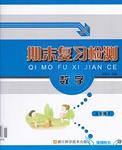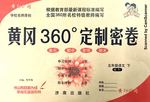
Hand in hand with reading, Dave ____ the habit of making notes.
A. caused B. brought C. created D. developed
 品學雙優卷系列答案
品學雙優卷系列答案 小學期末沖刺100分系列答案
小學期末沖刺100分系列答案 期末復習檢測系列答案
期末復習檢測系列答案 超能學典單元期中期末專題沖刺100分系列答案
超能學典單元期中期末專題沖刺100分系列答案 黃岡360度定制密卷系列答案
黃岡360度定制密卷系列答案科目:高中英語 來源:江蘇省南京市第一中學2010屆高三下學期模擬訓練最后沖刺英語試題 題型:完型填空
第二節完形填空(共20小題;每小題1分,滿分20分)
請認真閱讀下面短文,從短文后各題所給的A、B、C、D四個選項中,選出最佳選項,并在答題卡上將該項涂黑。
What is it about maths, anyway? Why is it that a ___36___ who would rather die than ___37___ they found reading difficult at school will happily say he is brain-dead when it ___38___ to numbers?
“I was ___39___ at maths at school,” they say. “still am. Can’t ___40___ up to save my life. My little girl takes after____41___. Thinks take-aways are something to do with fish and chips. Ha-ha!” Oh, how we all laugh.
But how many of us remember it being ___42___ at the time? How many of us remember the blind panic of the Monday morning maths test when the ___43___ we could hope for was a miracle(奇跡) to make the numbers we ___44___ without thinking as answers somehow ___45___ the questions?
On the face of it, today’s children can ___46___ be considered happier and more satisfied. They have a daily numeracy lesson ___47___ to improving their maths skills. But if that sounds like hell to you, you may ___48__ find that your child surprises you by actually quite ___49__ it.
One of the __50___ is that over the last ten years or so, there has been a ___51___ in the way maths is taught. And many of those who teach it feel it’s been a ___52__ for the better. There’s generally much more emphasis now on __53___ arithmetic, getting children used to doing calculations without forever having a pen in one hand and a calculator in the other. Often the first question a teacher will ask is: can you do this in your___54___? And if they can, they do.
The whole approach is more___55___, the goal to get children understanding numbers, not just putting them through the uninteresting process of learning something by repeating it until they remember it.
36 A. teacher B. parent C. pupil D. teenager
37 A. understand B. admit C. observe D. pretend
38 A. add B. relate C. comes D. reject
39 A. good B. expert C. special D. rubbish
40 A. add B. make C. look D. pick
41 A. stranger B. me C. herself D. somebody
42 A. funny B. easy C. attractive D. remote
43 A. worst B. prize C. best D. surprising
44 A. missed B. lost C. found D. chose
45 A. get B. foresee C. fit D. evaluate
46 A. however B. frequently C. mostly D. hardly
47 A. suggested B. devoted C. intended D. adapted
48 A. well B. sometimes C. seldom D. extremely
49 A. enjoying B. hating C. objecting D. mastering
50 A. consequences B. reasons C. findings D. incidents
51 A. mistake B. program C. policy D. revolution
52 A. preparation B. reputation C. requirement D. change
53 A. difficult B. general C. mental D. basic
54 A. class B. head C. textbook D. own
55 A. logical B. unbelievable C. direct D. conservative
查看答案和解析>>
科目:高中英語 來源:江蘇省南京市2010屆高三下學期模擬訓練最后沖刺英語試題 題型:完形填空
第二節 完形填空(共20小題;每小題1分,滿分20分)
請認真閱讀下面短文,從短文后各題所給的A、B、C、D四個選項中,選出最佳選項,并在答題卡上將該項涂黑。
What is it about maths, anyway? Why is it that a ___36___ who would rather die than ___37___ they found reading difficult at school will happily say he is brain-dead when it ___38___ to numbers?
“I was ___39___ at maths at school,” they say. “still am. Can’t ___40___ up to save my life. My little girl takes after____41___. Thinks take-aways are something to do with fish and chips. Ha-ha!” Oh, how we all laugh.
But how many of us remember it being ___42___ at the time? How many of us remember the blind panic of the Monday morning maths test when the ___43___ we could hope for was a miracle(奇跡) to make the numbers we ___44___ without thinking as answers somehow ___45___ the questions?
On the face of it, today’s children can ___46___ be considered happier and more satisfied. They have a daily numeracy lesson ___47___ to improving their maths skills. But if that sounds like hell to you, you may ___48__ find that your child surprises you by actually quite ___49__ it.
One of the __50___ is that over the last ten years or so, there has been a ___51___ in the way maths is taught. And many of those who teach it feel it’s been a ___52__ for the better. There’s generally much more emphasis now on __53___ arithmetic, getting children used to doing calculations without forever having a pen in one hand and a calculator in the other. Often the first question a teacher will ask is: can you do this in your___54___? And if they can, they do.
The whole approach is more___55___, the goal to get children understanding numbers, not just putting them through the uninteresting process of learning something by repeating it until they remember it.
36 A. teacher B. parent C. pupil D. teenager
37 A. understand B. admit C. observe D. pretend
38 A. add B. relate C. comes D. reject
39 A. good B. expert C. special D. rubbish
40 A. add B. make C. look D. pick
41 A. stranger B. me C. herself D. somebody
42 A. funny B. easy C. attractive D. remote
43 A. worst B. prize C. best D. surprising
44 A. missed B. lost C. found D. chose
45 A. get B. foresee C. fit D. evaluate
46 A. however B. frequently C. mostly D. hardly
47 A. suggested B. devoted C. intended D. adapted
48 A. well B. sometimes C. seldom D. extremely
49 A. enjoying B. hating C. objecting D. mastering
50 A. consequences B. reasons C. findings D. incidents
51 A. mistake B. program C. policy D. revolution
52 A. preparation B. reputation C. requirement D. change
53 A. difficult B. general C. mental D. basic
54 A. class B. head C. textbook D. own
55 A. logical B. unbelievable C. direct D. conservative
查看答案和解析>>
科目:高中英語 來源: 題型:閱讀理解
第二節 完形填空(共20小題;每小題1分,滿分20分)
請認真閱讀下面短文,從短文后各題所給的A、B、C、D四個選項中,選出最佳選項,并在答題卡上將該項涂黑。
What is it about maths, anyway? Why is it that a ___36___ who would rather die than ___37___ they found reading difficult at school will happily say he is brain-dead when it ___38___ to numbers?
“I was ___39___ at maths at school,” they say. “still am. Can’t ___40___ up to save my life. My little girl takes after____41___. Thinks take-aways are something to do with fish and chips. Ha-ha!” Oh, how we all laugh.
But how many of us remember it being ___42___ at the time? How many of us remember the blind panic of the Monday morning maths test when the ___43___ we could hope for was a miracle(奇跡) to make the numbers we ___44___ without thinking as answers somehow ___45___ the questions?
On the face of it, today’s children can ___46___ be considered happier and more satisfied. They have a daily numeracy lesson ___47___ to improving their maths skills. But if that sounds like hell to you, you may ___48__ find that your child surprises you by actually quite ___49__ it.
One of the __50___ is that over the last ten years or so, there has been a ___51___ in the way maths is taught. And many of those who teach it feel it’s been a ___52__ for the better. There’s generally much more emphasis now on __53___ arithmetic, getting children used to doing calculations without forever having a pen in one hand and a calculator in the other. Often the first question a teacher will ask is: can you do this in your___54___? And if they can, they do.
The whole approach is more___55___, the goal to get children understanding numbers, not just putting them through the uninteresting process of learning something by repeating it until they remember it.
36 A. teacher B. parent C. pupil D. teenager
37 A. understand B. admit C. observe D. pretend
38 A. add B. relate C. comes D. reject
39 A. good B. expert C. special D. rubbish
40 A. add B. make C. look D. pick
41 A. stranger B. me C. herself D. somebody
42 A. funny B. easy C. attractive D. remote
43 A. worst B. prize C. best D. surprising
44 A. missed B. lost C. found D. chose
45 A. get B. foresee C. fit D. evaluate
46 A. however B. frequently C. mostly D. hardly
47 A. suggested B. devoted C. intended D. adapted
48 A. well B. sometimes C. seldom D. extremely
49 A. enjoying B. hating C. objecting D. mastering
50 A. consequences B. reasons C. findings D. incidents
51 A. mistake B. program C. policy D. revolution
52 A. preparation B. reputation C. requirement D. change
53 A. difficult B. general C. mental D. basic
54 A. class B. head C. textbook D. own
55 A. logical B. unbelievable C. direct D. conservative
查看答案和解析>>
科目:高中英語 來源: 題型:完形填空
查看答案和解析>>
湖北省互聯網違法和不良信息舉報平臺 | 網上有害信息舉報專區 | 電信詐騙舉報專區 | 涉歷史虛無主義有害信息舉報專區 | 涉企侵權舉報專區
違法和不良信息舉報電話:027-86699610 舉報郵箱:58377363@163.com